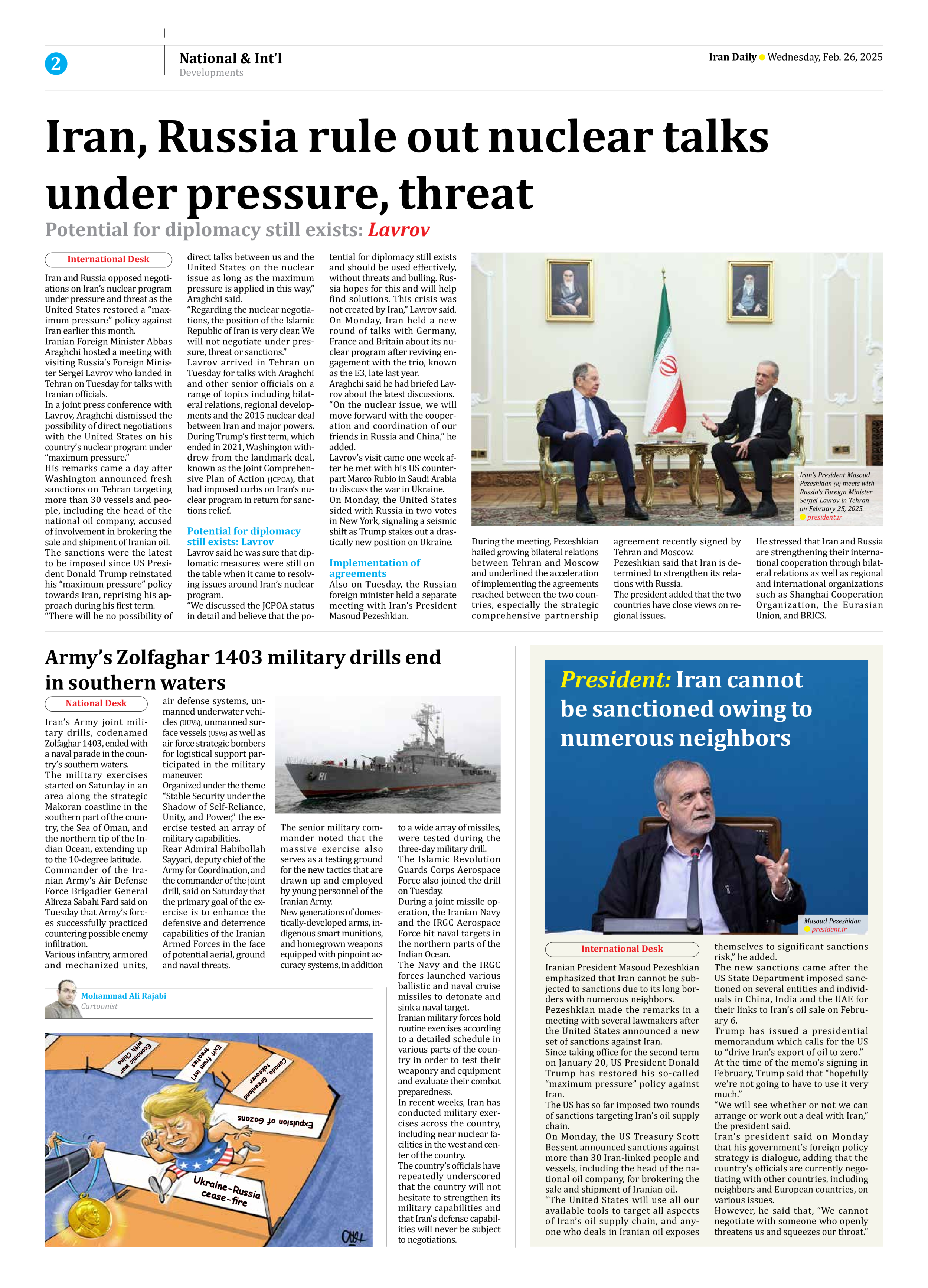
Iran, Russia rule out nuclear talks under pressure, threat
Potential for diplomacy still exists: Lavrov
Iran and Russia opposed negotiations on Iran’s nuclear program under pressure and threat as the United States restored a “maximum pressure” policy against Iran earlier this month.
Iranian Foreign Minister Abbas Araghchi hosted a meeting with visiting Russia’s Foreign Minister Sergei Lavrov who landed in Tehran on Tuesday for talks with Iranian officials.
In a joint press conference with Lavrov, Araghchi dismissed the possibility of direct negotiations with the United States on his country’s nuclear program under “maximum pressure.”
His remarks came a day after Washington announced fresh sanctions on Tehran targeting more than 30 vessels and people, including the head of the national oil company, accused of involvement in brokering the sale and shipment of Iranian oil.
The sanctions were the latest to be imposed since US President Donald Trump reinstated his “maximum pressure” policy towards Iran, reprising his approach during his first term.
“There will be no possibility of direct talks between us and the United States on the nuclear issue as long as the maximum pressure is applied in this way,” Araghchi said.
“Regarding the nuclear negotiations, the position of the Islamic Republic of Iran is very clear. We will not negotiate under pressure, threat or sanctions.”
Lavrov arrived in Tehran on Tuesday for talks with Araghchi and other senior officials on a range of topics including bilateral relations, regional developments and the 2015 nuclear deal between Iran and major powers.
During Trump’s first term, which ended in 2021, Washington withdrew from the landmark deal, known as the Joint Comprehensive Plan of Action (JCPOA), that had imposed curbs on Iran’s nuclear program in return for sanctions relief.
Potential for diplomacy still exists: Lavrov
Lavrov said he was sure that diplomatic measures were still on the table when it came to resolving issues around Iran’s nuclear program.
“We discussed the JCPOA status in detail and believe that the potential for diplomacy still exists and should be used effectively, without threats and bulling. Russia hopes for this and will help find solutions. This crisis was not created by Iran,” Lavrov said.
On Monday, Iran held a new round of talks with Germany, France and Britain about its nuclear program after reviving engagement with the trio, known as the E3, late last year.
Araghchi said he had briefed Lavrov about the latest discussions.
“On the nuclear issue, we will move forward with the cooperation and coordination of our friends in Russia and China,” he added.
Lavrov’s visit came one week after he met with his US counterpart Marco Rubio in Saudi Arabia to discuss the war in Ukraine.
On Monday, the United States sided with Russia in two votes in New York, signaling a seismic shift as Trump stakes out a drastically new position on Ukraine.
Implementation of agreements
Also on Tuesday, the Russian foreign minister held a separate meeting with Iran’s President Masoud Pezeshkian.
During the meeting, Pezeshkian hailed growing bilateral relations between Tehran and Moscow and underlined the acceleration of implementing the agreements reached between the two countries, especially the strategic comprehensive partnership agreement recently signed by Tehran and Moscow.
Pezeshkian said that Iran is determined to strengthen its relations with Russia.
The president added that the two countries have close views on regional issues.
He stressed that Iran and Russia are strengthening their international cooperation through bilateral relations as well as regional and international organizations such as Shanghai Cooperation Organization, the Eurasian Union, and BRICS.







